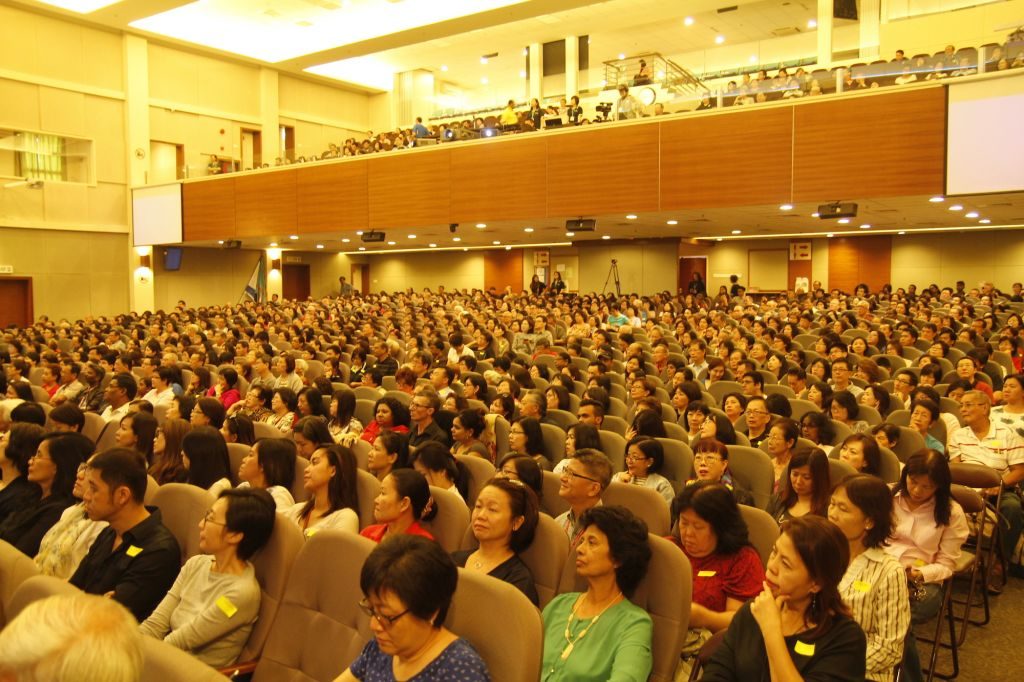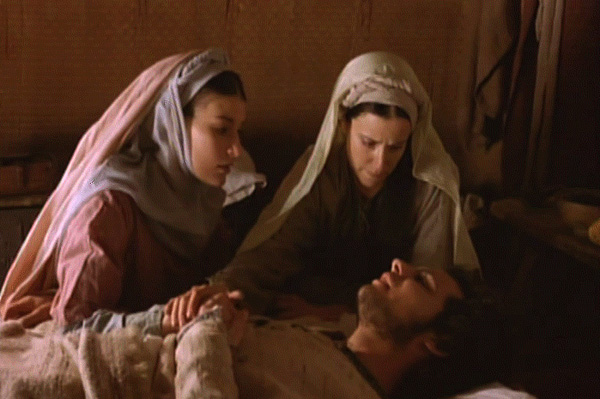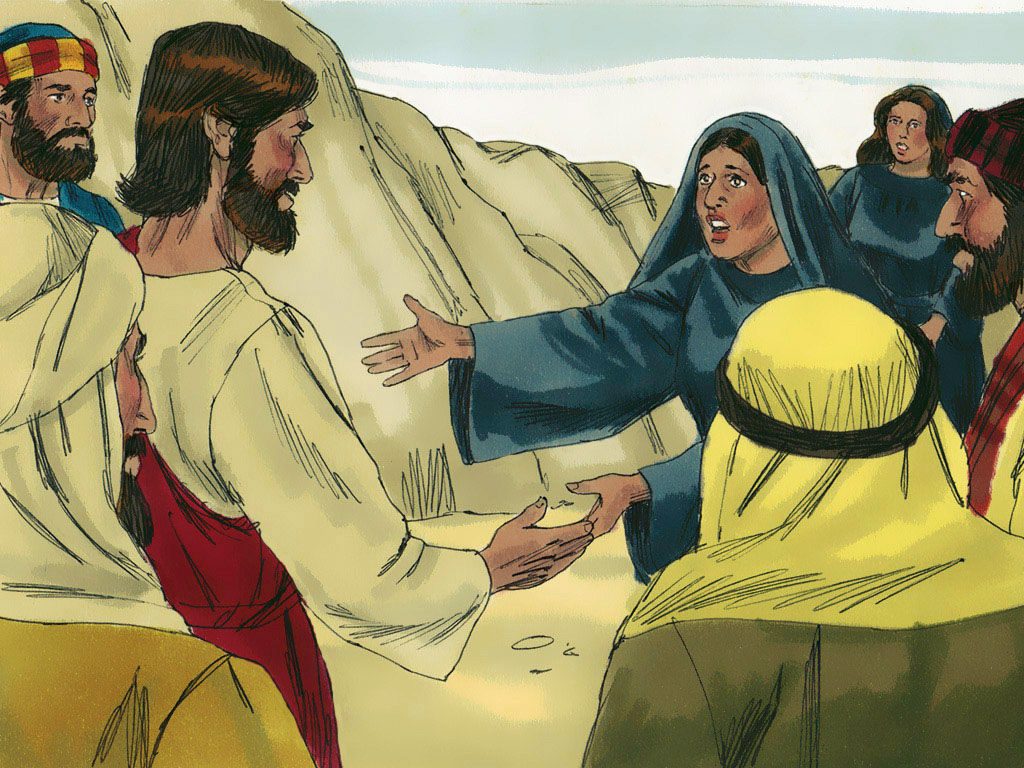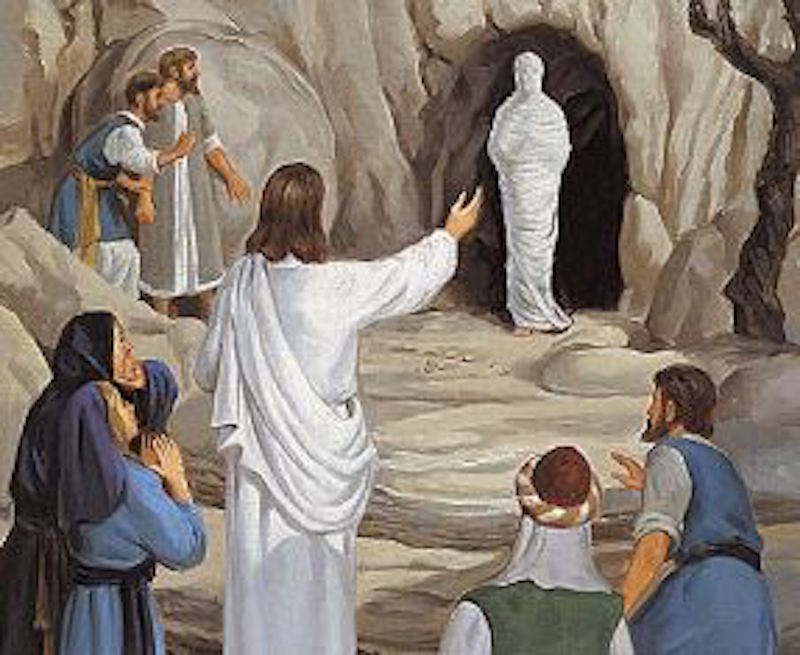
On June 25th, Ps. Peter Tsukahira spoke at the SOM (School of Ministry) Conference that was held at FGA (Full Gospel Assembly) Kuala Lumpur. The one-day conference focused on the power of God and His love.

In the first session, Ps. Tsukahira talked about the power of thanksgiving. “It’s a good thing to give thanks to the Lord,” he said. “Giving thanks is an essential component to our faith.” In fact, thanksgiving can be an act of spiritual warfare. In the days of King Jehoshaphat, God gave Israel instructions to send out their singers and worshippers to the forefront of battle, to face superior military forces.
“You would think that they would have sung something about our God being awesome, mighty, and ferocious,” Ps. Tsukahira said, “Instead, they sang, ‘Give thanks to the Lord for He is good. His mercies endure forever.’” They sang a song of thanksgiving to God for His goodness, and they destroyed the enemy without even a fight. Throughout the psalms, we see this same attitude of gratitude.
Ps. Tsukahira then went through the narrative of Lazarus (John 11:1-45) to illustrate the power of thanksgiving in an oppressive and difficult situation to bring freedom and a release of God’s power into the hearts of people.
1 Now a certain man was sick, Lazarus of Bethany, the village of Mary and her sister Martha. 2 It was the Mary who anointed the Lord with ointment, and wiped His feet with her hair, whose brother Lazarus was sick. 3 So the sisters sent word to Him, saying, “Lord, behold, he whom You love is sick.” 4 But when Jesus heard this, He said, “This sickness is not to end in death, but for the glory of God, so that the Son of God may be glorified by it.” 5 Now Jesus loved Martha and her sister and Lazarus. 6 So when He heard that he was sick, He then stayed two days longer in the place where He was.
Jesus and his disciples were ministering somewhere in Israel, a long distance away from the Jerusalem area. Mary, and Martha, and Lazarus lived in a little village called Bethany, which is on the other side of the Mount of Olives, a Sabbath’s day walk from Jerusalem. It’s pretty clear in this instance that Lazarus had not just gotten the flu. He did not have a minor illness. Although Scripture doesn’t say what it was, his sisters were worried that he was not going to live.

So they sent a messenger to find Jesus the messenger eventually did find him. He delivered his message from Mary and Martha about Lazarus, and Jesus said, “This sickness is not to end in death, but for the glory of God, so that the Son of God may be glorified by it.” The messenger took Jesus’ word for it, and went all the way back to Bethany with that message.
Jesus loved Mary and Martha. They were personal friends. When Jesus was in the Jerusalem area, He would often stay in their home. But instead of rushing to Lazarus’ aid, he stayed where he was in this other part of the country for another two days.
7 Then after this He said to the disciples, “Let us go to Judea again.” 8 The disciples said to Him, “Rabbi, the Jews were just now seeking to stone You, and are You going there again?” 9 Jesus answered, “Are there not twelve hours in the day? If anyone walks in the day, he does not stumble, because he sees the light of this world. 10 But if anyone walks in the night, he stumbles, because the light is not in him.”
11 This He said, and after that He said to them, “Our friend Lazarus has fallen asleep; but I go, so that I may awaken him out of sleep.” 12 The disciples then said to Him, “Lord, if he has fallen asleep, he will recover.” 13 Now Jesus had spoken of his death, but they thought that He was speaking of literal sleep. 14 So Jesus then said to them plainly, “Lazarus is dead, 15 and I am glad for your sakes that I was not there, so that you may believe; but let us go to him.” 16 Therefore Thomas, who is called Didymus, said to his fellow disciples, “Let us also go, so that we may die with Him.”
We see from this conversation that Jesus had with His disciples did not want to make that trip back to Judea. Thomas goes so far as to say that they would be killed with Jesus if they went back. It was not a happy band of ministers that made their way back to Judea, and apparently, they went very slowly too. By the time they arrived, Lazarus had already been dead for four days.
17 So when Jesus came, He found that he had already been in the tomb four days. 18 Now Bethany was near Jerusalem, about two miles off; 19 and many of the Jews had come to Martha and Mary, to console them concerning their brother.
In Jewish tradition, a body is buried within twenty-four hours after the person’s death, and a funeral is a very sad occasion. The Jews love life, and celebrate the birth of children with great joy. In contrast, death is very sad. The people weep and cry, and the family members participate in returning the body to the ground.
After the burial, the family members of the deceased would sit in their home for seven days and purposefully tear their clothes in mourning. This is called sitting shiva, and it is still practiced up to his day. During those seven days, everyone in the community—family, extended family, friends, friends of the extended family, business associates, and neighbors would visit the family.
As a form of social obligation, they would bring them food and sit around for half an hour to several hours. The house would be crowded and everyone is there to help and serve. For seven days, they fill the house to help the family through this difficult time of mourning.
This was exactly what was happening when Jesus and His disciples arrived in Bethany. Lazarus had been buried for four days, and they were now in the middle of sitting shiva. Their house would have been jammed pack with everyone they knew when Jesus arrived—late.
20 Martha therefore, when she heard that Jesus was coming, went to meet Him, but Mary stayed at the house. 21 Martha then said to Jesus, “Lord, if You had been here, my brother would not have died. 22 Even now I know that whatever You ask of God, God will give You.” 23 Jesus said to her, “Your brother will rise again.” 24 Martha said to Him, “I know that he will rise again in the resurrection on the last day.” 25 Jesus said to her, “I am the resurrection and the life; he who believes in Me will live even if he dies, 26 and everyone who lives and believes in Me will never die. Do you believe this?” 27 She said to Him, “Yes, Lord; I have believed that You are the Christ, the Son of God, even He who comes into the world.”
So Martha ran out to meet Jesus at the edge of town, and said, “Lord, if You had been here, my brother would not have died.” While that may sound like a statement of faith, she was really saying, “Where were you? If you had come in time, none of this would have happened!” The messenger made it to Jesus and back in time, saying that it wasn’t going to end in death. But to Martha, Jesus hadn’t shown up, and Lazarus was dead.

Martha’s faith has been almost crushed by her brother’s death. It’s not just that she lost her brother, but because the One she had believed in this whole time apparently failed when it really counted for her and her family. Her faith has been hammered. But it’s not completely dead, as she is still able to say, “Even now I know that whatever You ask of God, God will give You.”
She was struggling, but she still held on to some faith. When Jesus questioned her faith in Him, she answered that she still believed in Him, and then went to the house to tell Mary about Jesus.
28 When she had said this, she went away and called Mary her sister, saying secretly, “The Teacher is here and is calling for you.” 29 And when she heard it, she got up quickly and was coming to Him. 30 Now Jesus had not yet come into the village, but was still in the place where Martha met Him. 31 Then the Jews who were with her in the house, and consoling her, when they saw that Mary got up quickly and went out, they followed her, supposing that she was going to the tomb to weep there. 32 Therefore, when Mary came where Jesus was, she saw Him, and fell at His feet, saying to Him, “Lord, if You had been here, my brother would not have died.”
Thinking that Mary was going to visit Lazarus’ tomb, the whole crowd—everyone gathered at the house—went with her to meet Jesus, and when she saw Him, she said the exact same thing to Him that her sister had said. Her faith too, has been shattered.
33 When Jesus therefore saw her weeping, and the Jews who came with her also weeping, He was deeply moved in spirit and was troubled, 34 and said, “Where have you laid him?” They said to Him, “Lord, come and see.” 35 Jesus wept. 36 So the Jews were saying, “See how He loved him!” 37 But some of them said, “Could not this man, who opened the eyes of the blind man, have kept this man also from dying?”
Why did Jesus weep? What was He crying about? Was He crying for Lazarus? No, He knew what was going to happen with Lazarus. He’s weeping for Mary and Martha, and their friends because their faith has been shattered. Just imagine for a moment the kind of anguish they were going through.
The messenger came back and said, “I found Jesus! When I told Him that Lazarus is sick and could die, He said, ‘This will not end in death, but that God will be glorified by it.’” The sisters would have hung on to the words of the Son of God until the very last minute.
They would have encouraged each other and tried to encourage their brother to hold on. They probably told Lazarus, “You’re going to get better!” They prayed. They hoped. They told their friends. And they watched their brother get weaker and weaker as the days went by until he gave up his life.
Jesus knew the suffering they had been through and were still in because of Him. He could have been there in time. He could have even spoken the word from wherever He was and healed Lazarus. But He chose not to do that. Mary and Martha (and their friends) had been through a testing and almost a breaking of their faith on purpose. And so He wept—because that was such a dark day for them.
Of course, the crowd totally misunderstood what was going on and thought that Jesus was weeping because He missed His friend. But some of them asked why He could not have stopped Lazarus from dying. Among them were unbelieving skeptics thought of Jesus as just a celebrity preacher—yet another hypocrite.
38 So Jesus, again being deeply moved within, came to the tomb. Now it was a cave, and a stone was lying against it. 39 Jesus said, “Remove the stone.” Martha, the sister of the deceased, said to Him, “Lord, by this time there will be a stench, for he has been dead four days.” 40 Jesus said to her, “Did I not say to you that if you believe, you will see the glory of God?” 41 So they removed the stone. Then Jesus raised His eyes, and said, “Father, I thank You that You have heard Me.
At this point, Ps. Tsukahira zeroed in on this one thing that Jesus said. He began his prayer—one of the most powerful prayers in the Bible with “Father, I thank You…”
“That’s the attitude of gratitude that gives wings to your prayers in the midst of the valley of the shadow of death,” Ps. Tsukahira said. “That’s the attitude of gratitude that pierces the heavens and opens the gates of the Kingdom for you and me. In this picture, there is only one person who is thanking God, and that is Jesus!
“The sisters are not thanking God. They are grieving for the loss of their brother and they are fighting bitterness and disappointment while Jesus speaks. The disciples are not thanking God. They don’t want to be there. They’re just waiting for this to be over so that they can return to Galilee. The crowd is skeptical. Jesus is the only person who thanks God. But it is the power of thanksgiving that turns this whole situation around.”
In 1 Thessalonians 5:18, Paul writes, “In everything, give thanks. For this is the will of God concerning you.” Don’t give thanks for everything—because you’re going to face some really awful situations and some of them may be caused by the devil. But in everything, as a child of God, you have the opportunity—the privilege, and the authority to give thanks—no matter what you’re going through. Jesus continued:
42 I knew that You always hear Me; but because of the people standing around I said it, so that they may believe that You sent Me.” 43 When He had said these things, He cried out with a loud voice, “Lazarus, come forth.”
“You have to imagine the look on the faces of the people,” Ps. Tsukahira said. ‘They must have been just shocked. They would have been thinking, ‘What in the world is He doing?’ And there were others in the crowd who were probably thinking, ‘This is not going to end well. If nothing happens, this is going to be worse than before He showed up.’ They were concerned for Mary and Martha. Jesus had shouted into the mouth of the cave, and now there was just silence.

“Then after a moment, you probably could have heard a little rustling sound, coming from inside the cave. Then as they watch in amazement, they would have realized that in the darkness, there appeared to be some movement. Then this human figure wrapped in white cloth staggered to the opening of the cave and into the sunlight.”
44 The man who had died came forth, bound hand and foot with wrappings, and his face was wrapped around with a cloth. Jesus said to them, “Unbind him, and let him go.”
The people were so shocked at what they were seeing that they probably didn’t know what to do. Jesus had to instruct them to unbind Lazarus. But the best part of this whole scenario is that all of the skeptical relatives, friends, and business associates saw what had happened before their eyes: Irrefutable evidence of the Son of God, and on the spot, they believed.
45 Therefore many of the Jews who came to Mary, and saw what He had done, believed in Him.
Now, we begin to see the unfolding of God’s purposes, and why He deliberately required His own friends to walk through the valley of death and why He subjected them to a hammering of their faith. He allowed them to go through an experience that would have crushed most people. They were hanging on to thread of faith by the time Jesus showed up. But now, we understand why: So that all their friends would see and believe in Him.
“If you look into their future, do you think that Mary and Martha would have looked back on what they went through and thanked God for it?” Ps. Tsukahira asked. “I do. I think that in the years that followed, that was one of their greatest experiences—one of the stories that they told their children and grandchildren. They would tell about how it was the most horrible experience of their lives until Jesus showed up and shouted into that cave.
“What about Lazarus? Do you think that he would have blamed Jesus for letting him die? Far from it! If you go on to read the rest of the chapter, Lazarus had such a powerful testimony that everywhere he went and whenever he told that story, everyone who listened to him believed. He became probably the greatest evangelist in Judea at that time. Imagine the questions people would have had for him.”
In John 12, Jesus returns to the Judea area, and Mary, Martha, and Lazarus have a dinner party for Him. Many of the Jewish people came not only because Jesus was there but because Lazarus, who had been raised from the dead was also there. John goes on to record in that same chapter that the chief priests planned to put Lazarus to death because wherever he told his testimony, people believed in Jesus and came to faith.
“The power of giving thanks in every situation is really an essential part of our faith. When you make a decision, no matter what you’re facing—even if it looks really bad—disastrous—like God has abandoned us. That is the very time to stop and give thanks. By faith, say thank You to the Lord. Allow the same spirit that raised Jesus from the dead to put an attitude of gratitude in your heart and to open the windows of heaven.
“How many of you are facing crises in your life? Whether it is a physical illness or an unsaved loved one or a broken relationship or a national crisis or something wrong in your business or ministry… now is the time to make that decision right in the face of it. For no other reason other than your faith because you know that your God is never wrong and never late.
“You just simply say, I’m going to give Him thanks. Father, I thank You—Just like Jesus did when He stepped up in front of that tomb and all those people. ‘I thank you because You always hear me…’”
|Share The Good News|




Leave a Reply